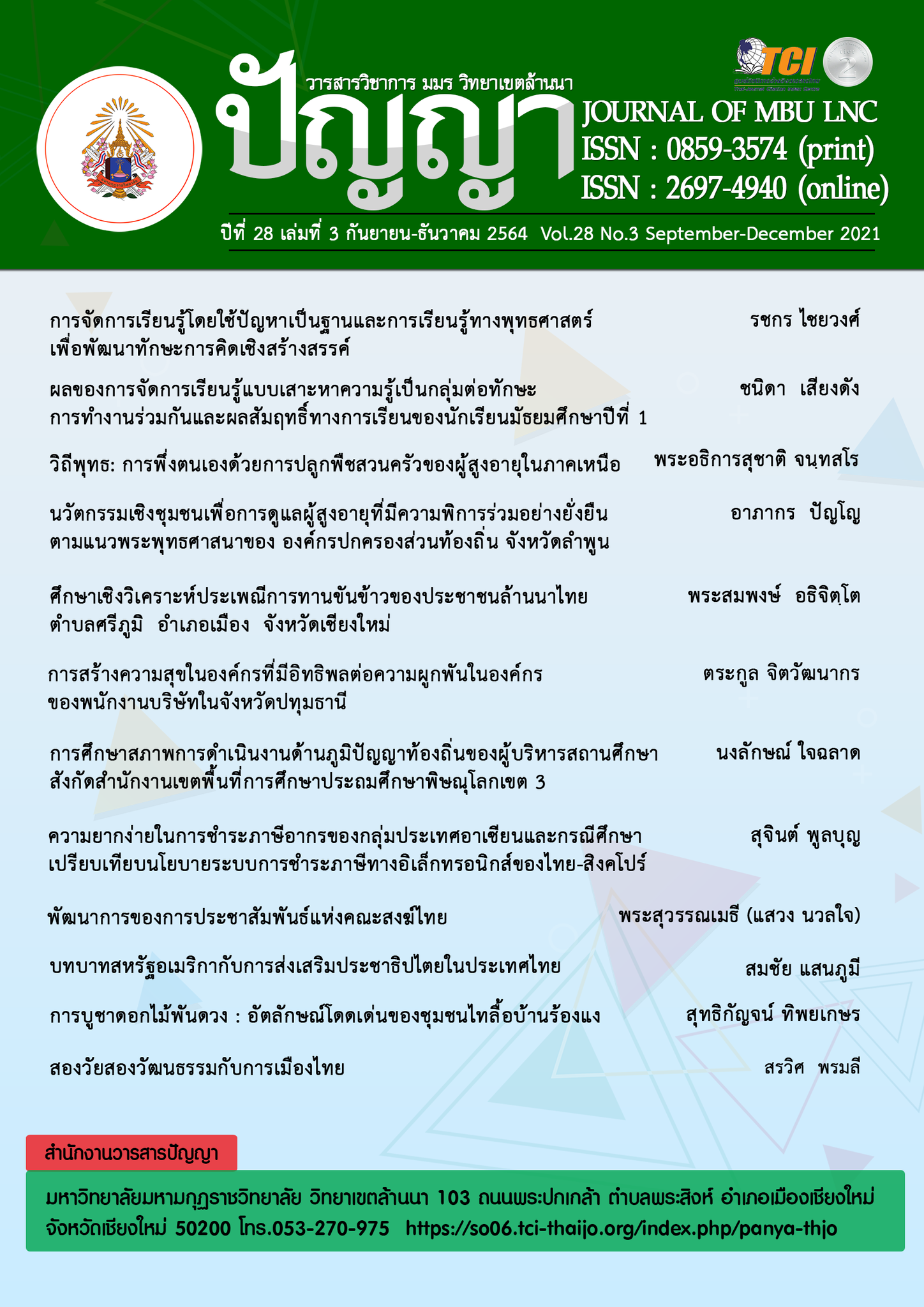บทบาทสหรัฐอเมริกากับการส่งเสริมประชาธิปไตยในประเทศไทย
คำสำคัญ:
บทบาทสหรัฐอเมริกา, การส่งเสริมประชาธิปไตยในประเทศไทย, กองทุนเพื่อประชาธิปไตยแห่งชาติสหรัฐอเมริกา, ม็อบนักศึกษาบทคัดย่อ
บทความนี้มีเป้าประสงค์เพื่อศึกษาบทบาทสหรัฐอเมริกากับการส่งเสริมประชาธิปไตยในประเทศไทยตั้งแต่ยุคหลังสงครามโลกครั้งที่ 2 ยุคสงครามเย็น และหลังสงครามเย็นจนถึงปัจจุบัน เพื่อแสดงให้เห็นถึงรูปแบบต่าง ๆ ในการส่งเสริมประชาธิปไตยไม่ว่าจะเป็นด้านกำลังทางทหาร ด้านเศรษฐกิจ ด้านงบประมาณ และด้านวัฒนธรรม เป็นต้น หลังสงครามเย็นสหรัฐอเมริกาใช้รูปแบบการสนับสนุนประชาธิปไตยแบบการให้ทุนองค์กรพัฒนาเอกชนต่าง ๆ ผ่าน National Endowment for Democracy (NED) เพื่อสร้างกิจกรรมพัฒนาประชาธิปไตยและสิทธิมนุษยชน รวมไปถึงการอบรมพัฒนาด้านต่าง ๆ และทุนวิจัยผ่าน US Agency for International Development (USAID) จนเกิดข้อถกเถียงว่าสหรัฐอเมริกาแทรกแซงกิจการภายในของไทยหรือไม่ แต่อย่างไรก็ตาม แม้ไม่มีหลักฐานเชิงประจักษ์ว่าสหรัฐอเมริกาเข้าแทรกแซงกิจการภายในของไทย แต่ปฏิเสธไม่ได้ว่าสหรัฐอเมริกามีบทบาทอย่างต่อเนื่องในการส่งเสริมประชาธิปไตย
เอกสารอ้างอิง
ดิ วันโอวัน เปอร์เซนต์. (2564). Constitution Dialogue : รัฐธรรมนูญสนทนา. สืบค้นจาก https://www.the101.world/category/constitution-dialogue/
นิด้าโพล. (2564). กลุ่มราษฎรหรือม็อบสามนิ้ว ณ เวลานี้. สืบค้นจาก https://nidapoll.nida.ac.th/survey_detail?survey_id=491
บีบีซีไทย. (2563, 30 ตุลาคม). แฟลชม็อบนักศึกษา ถึง ชุมนุมใหญ่ของ "คณะราษฎร 2563" ลำดับเหตุการณ์ชุมนุมทางการเมืองปี 2563. สืบค้นจาก https://www.bbc.com/thai/thailand-54741254
ประชาชาติธุรกิจ. (2563, 5 พฤศจิกายน). iLaw เผย 6 แหล่งทุนสนับสนุน หลัง “อุ๊ หฤทัย” กล่าวหารับเงินจากอเมริกา-ยิว. สืบค้นจาก https://www.prachachat.net/social-media-viral/news-550474
มูลนิธิสื่อเพื่อการศึกษาของชุมชน. (2564). วัตถุประสงค์ของการก่อตั้งมูลนิธิสื่อเพื่อการศึกษาของชุมชน. สืบค้นจาก https://www.fcem.info/th
มูลนิธิอาสาสมัครเพื่อสังคม. (2564). มอส. คือใคร. สืบค้นจาก https://www.thaivolunteer.org/tvs-มอส
ศูนย์ทนายความเพื่อสิทธิมนุษยชน. (2564). หลักเกณฑ์ช่วยเหลือคดี. สืบค้นจากhttps://tlhr2014.com/casesguidelines
สถานทูตสหรัฐและสถานกงสุลในประเทศไทย. (2563, 11 กันยายน). แถลงการณ์แก้ไขข้อมูลบิดเบือน. สืบค้นจาก https://th.usembassy.gov/th/statement-refuting-disinformation-th/
สมชัย แสนภูมี และคณะ. (2562). นักศึกษากับการเคลื่อนไหวทางการเมืองในวันครบรอบ 1 ปี การทำรัฐประหารของ พลเอกประยุทธ์ จันทร์โอชา. Veridian E-Journal,Silpakorn University (Humanities, Social Sciences and arts), 12(1), 1089-1106. สืบค้นจาก https://he02.tci-thaijo.org/index.php/Veridian-E-Journal/article/view/141352
สมาคมนักกฎหมายสิทธิมนุษยชน. (2564). รายละเอียดสมาคมนักกฎหมายสิทธิมนุษยชน. สืบค้นจาก https://naksit.net/about/
ไอลอว์ (iLaw). (2563, 15 กันยายน). ภาคประชาชนบุกสภา แจ้งครบ 50,000 ชื่อแก้รัฐธรรมนูญแล้ว. สืบค้นจาก https://www.ilaw.or.th/node/5749
Girling, J. L. S. (1981). Thailand: Society and Politics. New York: Cornell University Press.
Glassman, J. (2004). Thailand at the Margins: Internationalization of the State and the Transformation of Labour. New York: Oxford University Press.
Harding, B. (2018, 7 August). Moving the U.S-Thailand Alliance Forward. Retrieved from https://www.csis.org/analysis/moving-us-thailand-alliance-forward
Jäger, K. (2012). Why did Thailand's middle class turn against a democratically elected government? The information-gap hypothesis. Democratization, 19(6), 1138-1165. doi:10.1080/13510347.2011.623353
Knack, S. (2004). Does Foreign Aid Promote Democracy?. International Studies Quarterly, 48(1), 251-266. Retrieved from http://www.jstor.org/stable/3693571
McCargo, D. (2005). Network Monarchy and Legitimacy Crises in Thailand. The Pacific Review, 18(4), 466-519. doi:10.1080/09512740500338937
Meernik, J., Krueger, E. L., & Poe, S. C. (1998). Testing Models of U.S. Foreign Policy: Foreign Aid during and after the Cold War. The Journal of Politics, 60(1), 63-85. doi:10.2307/2648001
Miller, Z. J. (2014, 22 May). U.S. Condemns Thai Takeover As a Coup, Leaving Aid in Question. Retrieved from https://time.com/109601/us-thailand-coup/
Murashima, E. (1988). The Origin of Modern Official State Ideology in Thailand. Journal of Southeast Asian Studies, 19(1), 80-96. doi:10.1017/S0022463400000345
National Endowment for Democracy. (2021). Grants Database Thailand 2016-2020. Retrieved from https://www.ned.org/
Painter, M. (2006). Thaksinisation or Managerialism? Reforming the Thai Bureaucracy. Journal of Contemporary Asia, 36(1), 26-48. doi:10.1080/00472330680000031
Peceny, M. (1995). Two Paths to the Promotion of Democracy during U.S. Military Interventions. International Studies Quarterly, 39(3), 371-401.
Scott, J. M. (1999). Transnationalizing Democracy Promotion: The role of Western Political Foundations and Think-tanks. Democratization, 6(3), 146-170. doi:10.1080/13510349908403625
Scott, J. M., & Steele, C. A. (2005). Assisting democrats or resisting dictators? The nature and impact of democracy support by the United States National Endowment for Democracy, 1990–99. Democratization, 12(4), 439-460. doi:10.1080/13510340500225947
Senate Committee on Foreign Relations. (2020). Menendez, Durbin, Colleagues Introduce Senate Resolution in Support of Thailand’s Pro-Democracy Movement. Retrieved from https://www.foreign.senate.gov/press/ranking/release/menendez-durbin-colleagues-introduce-senate-resolution-in-support-of-thailands-pro-democracy-movement
Strangio, S. (2020). US Senate Resolution Voices Support for Thai Protesters. Retrieved from https://thediplomat.com/2020/12/us-senate-resolution-voices-support-for-thai-protesters/



